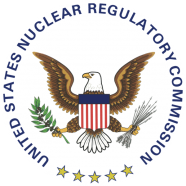NRC Rejects Nuclear Reactor for Too Much Foreign Owernship

A panel for the Nuclear Regulatory Commission
(NRC) has ruled against issuing a construction and
operating license for a proposed new nuclear reactor
in Maryland because it would have too much foreign
ownership.
A three-judge panel for the Atomic Safety and
Licensing Board (ASLB) issued the ruling Aug. 30 in
a case involving the proposed Calvert Cliffs 3
reactor in Lusby, Md., and UniStar Nuclear
Operating. The company has been seeking to operate a
U.S. Evolutionary Power Reactor that would be
located alongside the existing two Calvert Cliffs
units at the Calvert County location.
The ruling represents a victory for plant foes,
including Public Citizen, Southern Maryland Cares,
Beyond Nuclear and the Nuclear Information Resource
Service (NIRS). All those organizations had
intervened in the case.
The ASLB did give UniStar Nuclear Energy an
additional 60 days to secure a new U.S. partner for
the plant to replace Constellation Energy, which is
now part of Exelon (NYSE: EXC).
License opponents argued that the project will be
“owned, dominated and controlled by foreign
interests,” which is contrary to the Atomic Energy
Act.
Both UniStar Nuclear Operating and Calvert Cliffs 3
Nuclear Project, LLC are domestic subsidiaries of
UniStar Nuclear Energy, which is a Delaware
corporation. The sole owner of UniStar is
Electricite de France, S.A. (EDF), a French limited
company, the ASLB noted in a 29-page decision.
Constellation exit fueled ownership issue.
The ownership of Calvert Cliffs 3 didn’t become an
issue until November 2010. Until then, UniStar was
owned in near-equal shares by Baltimore-based
Constellation Energy Group and EDF. But in November
2010, applicants informed the NRC that EDF had
acquired Constellation’s 50% interest in UniStar,
thus making EDF the sole owner.
In January 2011, UniStar submitted a plan to NRC
seeking to address foreign control issues by setting
up a “security committee” of its board of directors,
made up of U.S. citizens, who would have exclusive
authority “over matters that are required to have
U.S. control,” the ASLB said.
But in April NRC informed UniStar that this proposal
would not solve the foreign control issue. During
the past couple of years that UniStar tried without
success to attract a new U.S. partner.
“Joint Intervenors caution that giving Applicants
additional time to find a suitable American partner,
and thus to meet the foreign ownership, control, or
domination requirements, could lead to an open-ended
proceeding,” according to the ASLB. Plant foes have
also said that UniStar has been mostly mum about the
status of its efforts or any timeframe when a
partner might be expected to join up.
“Applicants reiterate that they are committed to
obtaining a U.S. partner and recognize that a COL
for Calvert Cliffs Unit 3 may not be issued until an
appropriate U.S. partner is obtained,” the ASLB
noted.
But the board agreed with the plant opponents in
concluding that summary disposition was appropriate
on foreign ownership. “The AEA clearly prohibits the
NRC from issuing a reactor license to ‘any
corporation or other entity if the Commission knows
or has reason to believe it is owned, controlled, or
dominated by an alien, a foreign corporation, or a
foreign government,” according to the board.
There is currently no action plan that UniStar could
submit, regarding management structure, which would
be sufficient to negate EDF’s 100% foreign ownership
of UniStar.
Likewise, the ASLB said the cases UniStar cited to
bolster its case involve only NRC approval of
“minority owners transferring non-operating licenses
to foreign companies through mergers in which the
minority owners became wholly-owned subsidiaries of
foreign companies.” That’s considerably different
than allowing an operating nuclear plant to be
wholly owned by a foreign company, ASLB said.
“Given the apparent lack of progress in finding
potential U.S. partners, the amount of time that has
elapsed since Applicants became 100 percent foreign
owned, and the current economic climate, we are not
willing to grant Applicants an indefinite amount of
time to resolve this deficiency because doing so
would be counter to the Commission’s policies and
regulations,” the ASLB held.
“Although we cannot keep this proceeding open
indefinitely, we do grant Applicants an additional
60 days from the issuance of this order to notify
the Board of any change in the ownership situation
sufficient to establish their qualifications to
apply for a license from the NRC,” the ASLB said.
The board added that ASLB has already had two years
to find such a partner.
“That UniStar has been unable to find a single U.S.
utility to partner with it in this extraordinarily
expensive project speaks volumes about the lack of
genuine interest in new nuclear reactors in the
U.S.,” said NIRS Executive Director Michael
Mariotte.
This is only the second time in history a reactor
license has been denied by an Atomic Safety and
Licensing Board, NIRS said. The first was the
license application for the Byron reactor in
Illinois in 1984, which was briefly denied because
of quality assurance problems at the site. But that
decision was quickly overturned on appeal as the
utility already had initiated a program to correct
the problems.
Wayne Barber is chief analyst for generation for Energy Central's Generation Hub, where this story first appeared.
Copyright © 1996-2012 by CyberTech, Inc. All rights reserved.
To subscribe or visit go to: http://www.energycentral.com
To subscribe or visit go to: http://www.energybiz.com